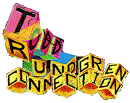 The Todd Rundgren Connection is brought to you by
Roger D. Linder &
The Todd Rundgren Connection is brought to you by
Roger D. Linder &
 Rocemabra Web Services.
Rocemabra Web Services.

The runt in any good litter or legend always manages to rise up and above the limits imposed on him. Like Mozart, Todd Rundgren never wanted to be born; his mother labored hard to put him here and he's fought hard to singe his musical autograph in the progressive pages of rock & roll.
Now after a couple of years of rock plodding in sleazy Wildwood, N.J., dives, a flashy fizz called Nazz and an underrated streaming rockin' autobiography called Runt. The Ballad of Todd Rundgren, Todd is at last enforcing his position as a producer-composer with the ballad.
A ballad is a story set to music; usually a tale of woe -- a horse thief, a hanging and a weeping girl. Todd's music is layered and intricate but his lyrics are easy; containing all the tragic ballad elements only the subjects are real contemporary. He has the ability to devour and juggle the best of what has passed and shoot it into future perfect.
"Long Flowing Robe" is an elegantly arranged cinderella story, only much dirtier. It also has the great 1958 school-dance cruising overtones Bobby Day voiced in his "...I said over and over and over again, this dance is gonna be a drag". "Range War" is reminiscent of the notorious Hatfield and McCoy feud, only again, much dirtier.
"The Ballad of Denny and Jean" and "Wailing Wall" are more personal and float in more tears than all the children in the world. The "Ballad" drifts through real beautiful music, further saddened by Waldo the singing guitar and the pain of corruption in original love.
A ballad is a song to dance to. There's a lot of good music, rock & roll slow dance music. About a quarter of the album consists of good grind songs. Especially fine is "Hope I'm Around", which hit me as hard as any of the great grinders of the late Fifties. Critics tend to question Todd's commercial value and have labeled him as too esoteric but in truth he is one of the few people around who are still writing and singing songs like they used to, along with Smokey Robinson and Ronnie Spector. His voice too is both unique and nostalgic; sometimes as slick as a Las Vegas choir boy, and often strained and honest as back street a cappella.
"Parole" is the most bitchin' track, bringing back memories of Bobby Fuller's "I Fought the Law". "Parole" hits out with hot prison jargon: "If they catch me out of line...I'll be down in the slammer' escaping with "..guitars, guitars, guitars, electric clavinette and plenty of sweat".
As "Parole" testifies, as well as "Devil's Bite" and "Who's that Man" on Runt, Todd pulses rock & roll, though it's evident from tracks like "Boat on the Charles" and "Chain Letter" he's a composer at heart, a sort of rock & roll Ravel. "Boat on the Charles" has a cinematic feel -- a real motion media cut. It has the most atmosphere produced around it: fog, despair and a truck going south on New Year's Eve. Listening to it is like going through a little movie..plunging into the Charles with the anti-hero as the ferry passes by.
Though he has always created from the best of a pre-formed world, he is slowly enveloping these sources with his personal vision. "Chain Letter" is the cut which most seems to reflect this vision. "Chain Letter" is the cut which most seems to reflect this vision. The lyrics have his typical left-handed optimism and just when they get jaded the track opens up; and multiplies, as "Hey Jude" did. But "Chain Letter" has more balls and goes through several changes while "Hey Jude" never went past spirited repetition.
If the album seems unbalanced it is after all the ballad album, yet not without comic relief. Todd releases a little protest through some good ole sick'n'sleazy satire in "Bleeding"; with the aid of some beer can percussion from that noted satanic drummer N.D. Smart: "Be a big man/Take up that gun/If you lose your hand/You got another one..."
Todd Rundgren has a fine hand in everything. For The Ballad he mixes his hard-edge comic book humor with the various musical colors of the putney; produced in a sort of warped rock space that most people have still failed to enter.
About a hundred years ago the runt of a Sioux tribe breathed his visions on his people. They dropped that runt crap and crowned him Crazy Horse. I think it's time "runt" be dropped from Todd Rundgren.
-- Patti Smith, Rolling Stone, 8-19-71.